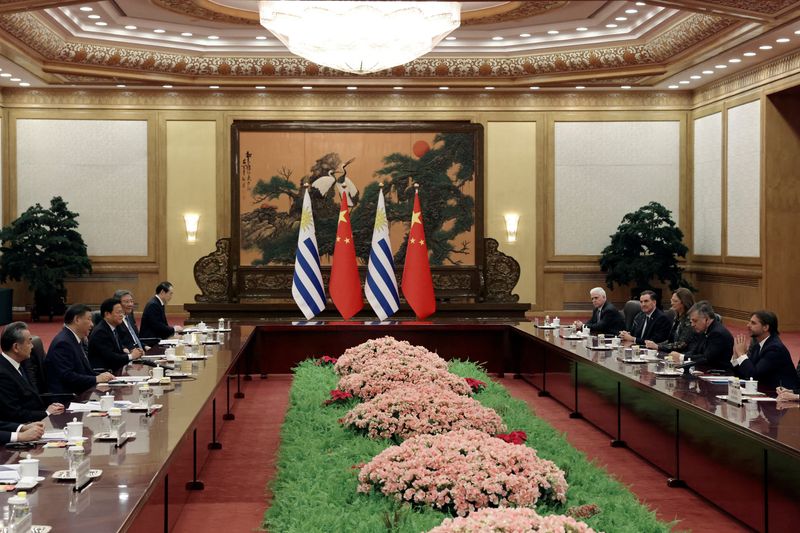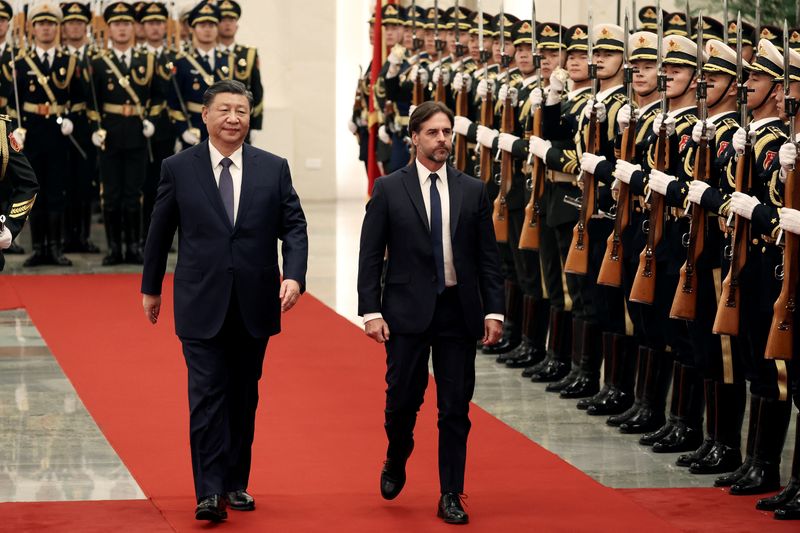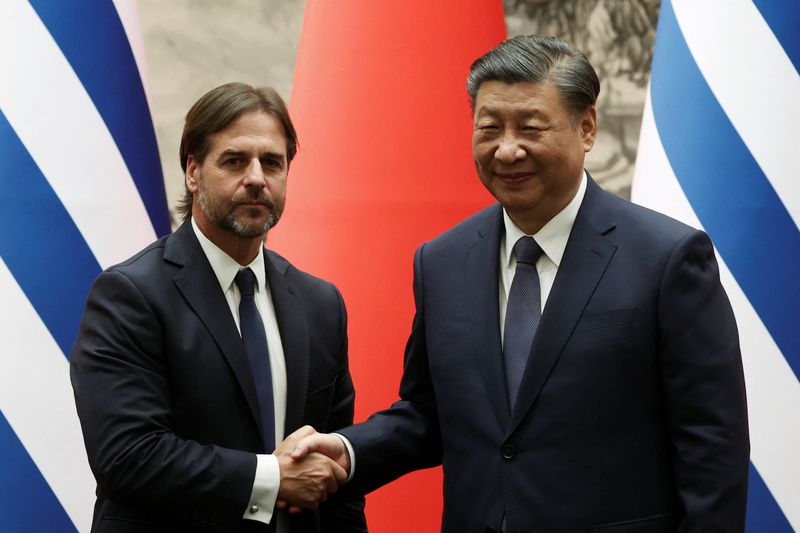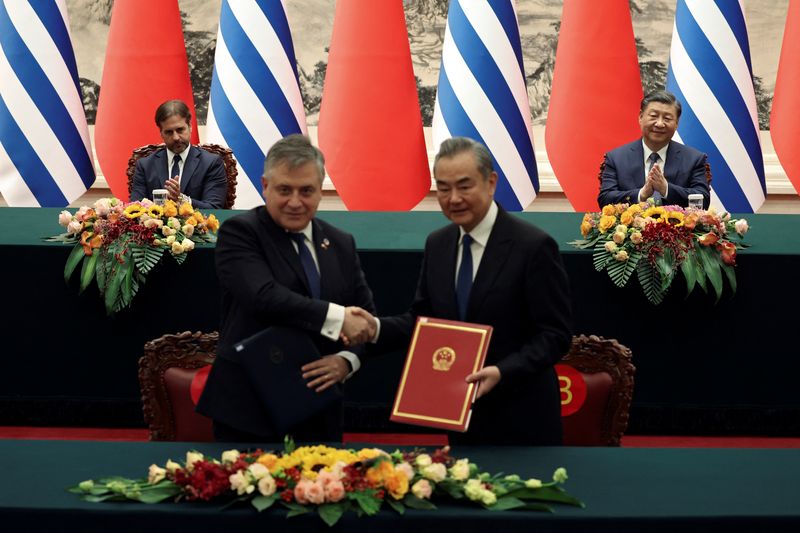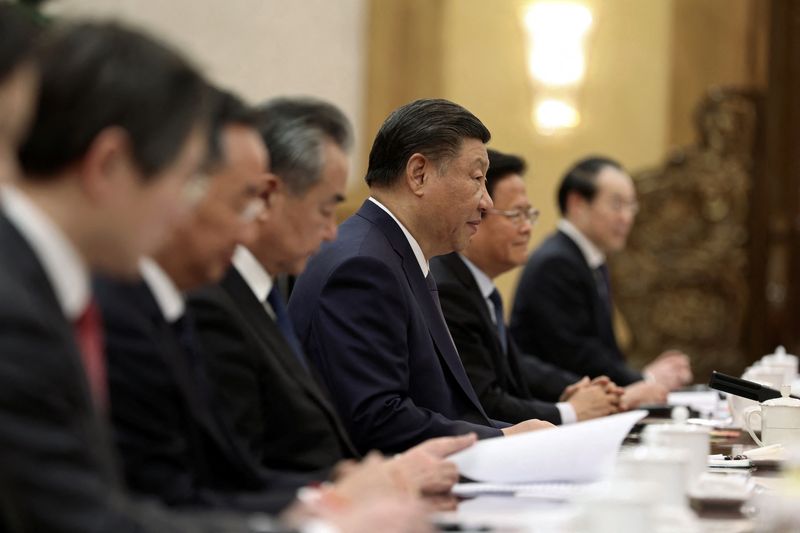By Joe Cash and Ryan Woo
BEIJING (Reuters) -China and Uruguay upgraded their bilateral ties on Wednesday, setting the stage for further trade and investment and elevating the ambitious South American country’s relations with Beijing to those of fellow Mercosur members Brazil and Argentina.
Uruguay is seeking to strike deals abroad that it hopes will be more beneficial to it than a local trade bloc, while China has for years sought closer ties with South America, in large part to secure access to raw materials such as grains and oils.
“China is ready to work with Uruguay to take establishing a comprehensive strategic partnership as a new starting point… and enrich cooperation,” President Xi Jinping told his Uruguayan counterpart Luis Lacalle Pou at a meeting in Beijing’s Great Hall of the People, Chinese state media reported.
China, the world’s second-largest economy, is already a major investor in South America and has offered tariff-free access to its huge consumer market to four countries.
Lacalle Pou first proposed a free trade agreement (FTA) with China in 2021 to secure similar opportunities for its exporters as those enjoyed by Chile, Costa Rica, Ecuador, and Peru, and to boost exports of raw materials, industrial goods and technology.
But Uruguay faces opposition from other members of the Mercosur bloc who want to settle an FTA with Europe instead.
At present, Beijing has no tariff preference for Uruguayan beef, which constituted 67% of the South American country’s exports to China in 2022, a market where there is a 12% tariff on the meat, United Nations COMTRADE data shows.
By comparison, other major beef exporters Australia and New Zealand, which have FTAs with China, pay tariffs at 3.3% and 0%.
Lacalle Pou commented on how China has become Uruguay’s main trading partner and told Xi during the meeting about plans to join the Shanghai-headquartered New Development Bank.
China received 27% of Uruguay’s exports in 2022, COMTRADE data shows, while Brazil purchased 17% of its outbound shipments, and Argentina and the United States 6% each.
MERCOSUR
Uruguay cannot easily sign a unilateral FTA with China because it agreed to a ‘Common External Tariff’ with Mercosur members, not least because the bloc reached agreement in principle on an FTA with Brussels in 2019.
The South American country has applied to join a major trans-pacific free trade pact that China also aspires to join, but Beijing must overcome major political hurdles before it can accede to the agreement and Montevideo faces the same restraints its Mercosur membership places upon it in negotiations.
Uruguay came close to signing an FTA with the United States in 2006, but its government at the time eventually rejected the deal over fears of expulsion from Mercosur if it did so.
Under the Mercosur CET, Chinese exporters must pay tariffs at 9%, should they wish to export to Uruguay, which is better than the 12% Uruguayan ranchers face on beef shipped to China.
According to a study conducted by the National Meat Institute of Uruguay in 2021, if China signs an FTA with Uruguay, the meat industry can implement a 0% preferential tariff, which will reduce tariffs by $150 million.
Xi and Lacalle Pou witnessed the signing of cooperation documents across a range of sectors including agriculture, education, and science and technology, as well as over customs inspections, which could be a boon for Uruguay’s meat exports.
Uruguay is one of the few countries to run a trade surplus with China, which last year doubled to $1.5 billion from $766 million in 2021, data from China’s National Bureau of Statistics shows.
The elevation of ties with Uruguay to the level of Brazil and Argentina also pushes the remaining Mercosur member Paraguay further outside China’s global trade and investment network.
Agriculture-dependent Paraguay, whose main exports include beef and soybeans, is the last South American nation that has ties with democratically governed Taiwan, which China claims as part of its territory, and not with Beijing.
Xi said he hoped to build “a model of solidarity and cooperation between countries of different sizes, systems and cultures” with Uruguay, while Lacalle Pou invited him to visit Uruguay next year.
(Reporting by Joe Cash and Ryan Woo; Additional reporting by Ella Cao; Editing by Toby Chopra, Raju Gopalakrishnan, Chizu Nomiyama and Alexander Smith)
